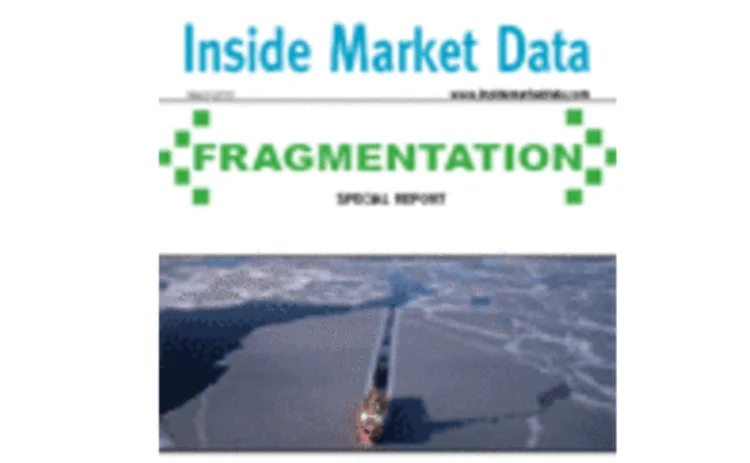Fragmentation special report

Click here to download the PDF
Taping Fragmented Markets Back Together
A few years ago, the London Stock Exchange and Euronext tried competing for trading in stocks listed on each other's markets. Then, neither was able to steal share from the other. But 2007's Markets in Financial Instruments Directive regulation changed that, enabling the creation of new trading venues providing execution in stocks listed on exchanges across Europe.
The move has resulted in lower trading costs by introducing competition to an area previously controlled by large, domestic exchange groups. At the same time, firms seeking to exploit the benefits of these new venues have faced the administrative burden of sourcing data from multiple new venues-even if most multilateral trading facilities initially make their market data available free of charge-to create a definitive "European Best Bid and Offer" price to govern their trading and smart order-routing.
But fragmentation isn't just a European issue. Canada has also seen an influx of new trading venues competing for market share, while many also see potential for competition between markets in Asia Pacific. Even though these markets lack a common currency or regulatory framework, some say that venues with high-frequency trading platforms might attract traders ready to arbitrage latency between different platforms, while the Association of Southeast Asian Nations is already building a trading link between four exchanges, with the aid of NYSE Technologies.
In an article in this report, Fidessa's Andrew Barella notes that-like the Asean marketplaces- Europe does not have a single currency (since the UK still trades in pounds sterling) or regulatory regime. Europe also lacks a single clearing and settlement
mechanism and a "consolidated tape" of equity market data, which are both present
in the US, where equity trading is fragmented between a combination of exchanges
and ECNs. A consolidated tape is a bone of contention for many, who feel that the
fragmentation created by regulation should have been accompanied by a mandated
tape of pan-European data to enable affordable access to information from the new
marketplaces. Even Canada already has a consolidated tape, operated by exchange group TMX.
If a regulator is mandating fragmentation and best execution, should it not also mandate a definitive source of data for best execution?
Click here to download the PDF
Only users who have a paid subscription or are part of a corporate subscription are able to print or copy content.
To access these options, along with all other subscription benefits, please contact info@waterstechnology.com or view our subscription options here: https://subscriptions.waterstechnology.com/subscribe
You are currently unable to print this content. Please contact info@waterstechnology.com to find out more.
You are currently unable to copy this content. Please contact info@waterstechnology.com to find out more.
Copyright Infopro Digital Limited. All rights reserved.
As outlined in our terms and conditions, https://www.infopro-digital.com/terms-and-conditions/subscriptions/ (point 2.4), printing is limited to a single copy.
If you would like to purchase additional rights please email info@waterstechnology.com
Copyright Infopro Digital Limited. All rights reserved.
You may share this content using our article tools. As outlined in our terms and conditions, https://www.infopro-digital.com/terms-and-conditions/subscriptions/ (clause 2.4), an Authorised User may only make one copy of the materials for their own personal use. You must also comply with the restrictions in clause 2.5.
If you would like to purchase additional rights please email info@waterstechnology.com
More on Data Management
Digital employees have BNY talking a new language
Julie Gerdeman, head of BNY’s data and analytics team, explains how the bank’s new operating model allows for quicker AI experimentation and development.
Can mastering data solve AI’s cognitive dissonance?
The IMD Wrap: Bank execs are still bullish on AI, but recent studies suggest it’s not the panacea they’re making it out to be. Can the two views be rectified?
Everything you need to know about market data in overnight equities trading
As overnight trading continues to capture attention, a growing number of data providers are taking in market data from alternative trading systems.
AI strategies could be pulling money into the data office
Benchmarking: As firms formalize AI strategies, some data offices are gaining attention and budget.
Identity resolution is key to future of tokenization
Firms should think not only about tokenization’s potential but also the underlying infrastructure and identity resolution, writes Cusip Global Services’ Matthew Bastian in this guest column.
Vendors are winning the AI buy-vs-build debate
Benchmarking: Most firms say proprietary LLM tools make up less than half of their AI capabilities as they revaluate earlier bets on building in-house.
Private markets boom exposes data weak points
As allocations to private market assets grow and are increasingly managed together with public market assets, firms need systems that enable different data types to coexist, says GoldenSource’s James Corrigan.
Banks hate data lineage, but regulators keep demanding it
Benchmarking: As firms automate regulatory reporting, a key BCBS 239 requirement is falling behind, raising questions about how much lineage banks really need.








